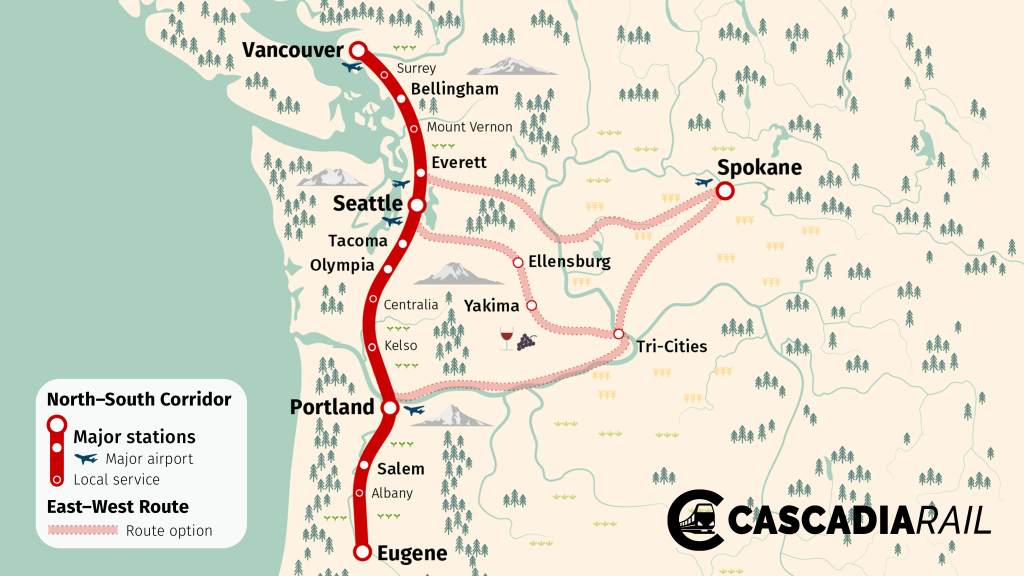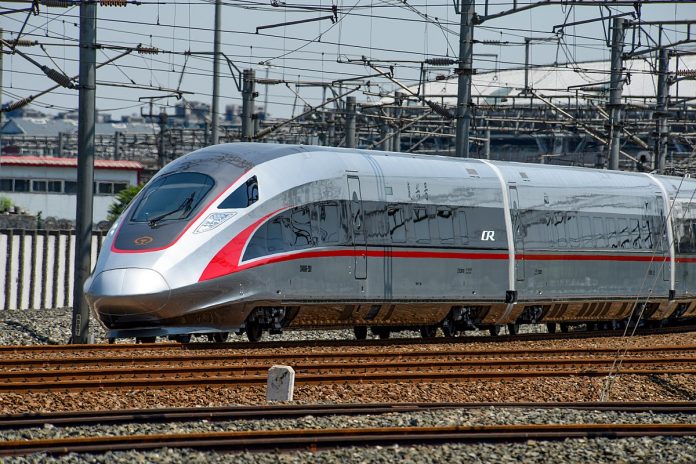In the latest transportation budget proposal, Washington House Democrats have kept some funding to lay the groundwork for an interstate high-speed rail corridor authority. Eventually corridor authority would be established to plan and implement high-speed rail between Vancouver, British Columbia and Portland via Seattle and several other intermediate cities. The proposal also would include funding to study a new passenger rail corridor between Spokane and Auburn via Stampede Pass. But the budget includes less funding than Governor Jay Inslee’s office requested.
Original High-Speed Rail Corridor Authority Proposal
In January, Representative Jake Fey (D-Tacoma), chair of the House Transportation Committee, introduced the original biennial transportation funding appropriations budget (House Bill 1160) through 2021. That version of the bill included Governor Jay Inslee’s (D-Washington) proposal to authorize $3.25 million to commission a corridor authority charged with developing an interstate governance structure in conjunction with Oregon and British Columbia. The corridor authority would also work with communities along the corridor to refine the high-speed rail alignment and make recommendations on funding levels and responsibilities to carry out advanced project development. All of this would have to build upon results from a business case study, which is currently in development, and ensure that the chosen high-speed rail technology will be capable of reaching at least 250 miles per hour at top speed.
The House Transportation Committee was then briefed in late January about the proposal and findings to date on the high-speed rail study. Members of the committee, including Chair Fey, seemed to express interest in the topic. Chair Fey explicitly asked Washington State Department of Transportation (WSDOT) staff to collaborate with him through the budgeting process, an indication of support.
New Budget Proposal Scales Back Funding for High-Speed Rail

The new transportation funding appropriation budget proposal came out on Monday. There are many similarities to the Governor’s request, but Chair Fey’s proposal drastically cuts back biennial funding for the effort and does not expressly create a corridor authority. Instead, WSDOT would continue to work through development of the high-speed rail program by leading the governance structure evaluation in-house as opposed to through a separate entity. Funding for the effort would be capped at $895,000 with only $224,000 guaranteed as a state appropriation. The remaining $671,000 would need to come from other partners.
Both the initial study in 2017 and business case analysis underway have been successful in getting support and funding from private companies like Microsoft and the trades. The governments of Oregon and British Columbia have also provided funding for both efforts, so it seems likely that other funding partners will come through. But any state contribution would be prohibited unless the full partner contribution of $671,000 materializes.
Assuming that partner funding is received, WSDOT would be charged with accomplishing several tasks over the next two years:
- WSDOT would be responsible for developing a governance structure to create an interstate high-speed rail corridor authority, include its powers, contracting requirements, and overall operating structure;
- WSDOT would need to conduct a review of laws, regulations, and agreements throughout Washington, Oregon, and British Columbia that may need to be changed or created to proceed with high-speed rail project development of the corridor; and
- WSDOT would need to provide other recommendations necessary to move ahead with project development of the corridor.
Recommendations by WSDOT would be due to the Washington State Legislature, Governor’s Office, and governments of Oregon and British Columbia by December 1, 2020.
Other Key Multimodal Transportation Studies Could Be Funded
Separately, WSDOT would be charged with studying a new intercity passenger rail corridor between Spokane and Auburn via Stampede Pass. Presumably, passengers would be able to transfer to existing Amtrak Cascades and Sound Transit South Sounder services for stations north and south of Auburn. This proposal is similar to the one proposed last year. The study would evaluate possible stops in intermediary cities, including Cle Elum, Ellensburg, Yakima, Tri-Cities, and Toppenish. It would also evaluate potential ridership, existing infrastructure conditions, and requirements to implement passenger rail service. $250,000 would be directly appropriated by the state for the study and a final report and recommendations would be due to the Washington State Legislature by January 15, 2020.
Other studies that are proposed for funding in the biennial transportation funding appropriations bill would include the following:
- $350,000 would be earmarked to study passenger-only ferry service between Puget Sound communities. The study would need to look at possible routes and terminals on Puget Sound, Lake Washington, and Lake Union and whether or not passenger-only ferry service would provide a net reduction in carbon emissions by passengers. The Puget Sound Regional Council would be charged with conducting the study and would need to provide a report by January 31, 2021.
- $250,000 would be earmarked to study discounted tolls for low-income motorists. The Washington State Transportation Commission would be charged with managing the study and providing a report and recommendations on implementing a program by December 1, 2021.
- $450,000 would be earmarked for the Joint Transportation Committee to study electrification of public fleets. A portion of this study would specifically look at electrification of public transportation systems. A report and recommendation would be due by June 30, 2020.
- $500,000 would be earmarked for Washington State Ferries to study how to maximize sailings on the “Triangle Route” between Fauntleroy, Southworth, and Vashon. The goal of the study is to create a new schedule that will move the most passengers win the least time within financial and operational constraints. A report would be due by January 15, 2021.
- $495,000 would be earmarked for Washington State Ferries to develop 10-year and 20-year ferry electrification implementation plans. The plans would be due by June 30, 2020.
- $750,000 would be earmarked for WSDOT to develop a transit-oriented development pilot project at the Kingsgate Park-and-Ride facility in Kirkland. The purpose of the pilot project is to demonstrate how WSDOT properties could be used for a variety of public purposes, aside from strictly transportation purposes. A report would need to be completed by December 1, 2019 to identify any legislative actions necessary to realize the pilot project. The pilot project would need to be completed by December 31, 2023.
- $1 million would be earmarked for WSDOT to develop a regional mobility plan for Ballard and Interbay. In consultation with Seattle, King County, the Port of Seattle, and Sound Transit, WSDOT would develop a plan to improve the movement of people and freight in the area. It would specifically need to address the issue of bridge replacement for the Ballard Bridge and Magnolia Bridge. A report and recommendations would be November 1, 2020.
Looking Ahead
On Wednesday, Washington Senate Democrats are poised to release their own version of the biennial transportation funding appropriations bill. There is no certainty in how close it might be to the version proposed by Chair Fey. Inevitably, the scope of the studies and their funding levels will change as the legislative process moves forward over the next few weeks. But Washington House Democrats appear prepared to back forward movement on high-speed rail and other critical transportation issues, so some progress on those issues is inevitable.
Stephen is a professional urban planner in Puget Sound with a passion for sustainable, livable, and diverse cities. He is especially interested in how policies, regulations, and programs can promote positive outcomes for communities. With stints in great cities like Bellingham and Cork, Stephen currently lives in Seattle. He primarily covers land use and transportation issues and has been with The Urbanist since 2014.



